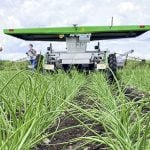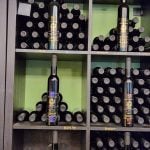Several businesses were at Canada’s Farm Show to gauge interest in their products and learn how to work in this country
REGINA — The war in Ukraine hasn’t stopped agricultural manufacturers from production and pursuing new markets.
A delegation representing several companies was at Canada’s Farm Show in June.
Taras Lysenko heads Clean Field, a grain bag manufacturer based in the Bucha district near Kiev since 2011.
Read Also

Heat waves combine sunshine and sinking air
As we continue our look at heat waves, I figured we should first define what they are by looking at the criteria Environment Canada uses to define heat events.
He said he would like to sell his product, White Bag, in Canada but first has to learn how business is conducted in this country.
“We have a quality product,” he said with help from an interpreter, noting that the bags comprise five layers of film and are used to store grain, corn, sunflower seeds and animal feed.
There was interest at the show but he said many want to buy from a local dealer. He also learned Canadian farmers generally use bags of larger diameters than those preferred in Ukraine. He can accommodate that, he said.
Lysenko said he will look for a representative in Canada, but it would have to be worth his while.
“We need to sell one container or two, but the farmer wants only a few bags,” he said.
The company would accept payment after the product is delivered, thereby accepting all the risk.
Building a small factory in Canada in the future might also be an option.
“In our country we have a war but we are used to working in these conditions,” he said. “It is a difficult situation but we hope in a couple of years we can work as usual.”
Lysenko said there are many companies in Ukraine that would like to collaborate with Canadians so trade can flow both ways.
Illia Lysenko, no relation to Taras, lives in Toronto with his mother while his father Sergei remains in Kiev to run his pumping equipment business.
He also served as his father’s interpreter at the show.
Illia said the company typically supplies the pumps and other equipment to southern Ukraine but the region is occupied.
“There are not many opportunities in Ukraine right now,” he said.
They hope there is interest in Saskatchewan, where a large-scale irrigation project is planned.
Mashzavod Tehnika produces diesel-powered units and has supplied municipalities and companies in Ukraine and other countries for 30 years.
The equipment is used in mining, oil and gas, and agriculture, and has been called upon to help in emergency situations. The family-owned business hopes to find a Canadian partner.
Everlast, a transport tank manufacturer, was also part of the delegation and seeking opportunities.
While the other two companies have seen the war negatively disrupt their business, Dmitriy Kovalenko said he has had to increase production twice since the war began.
The company produces tanks and trailers to move products such as fuel, ammonia, liquefied petroleum gas, slurry and even milk and water.
Kovalenko said that’s because fuel used to come by train from Russia.
“Now we stopped importing and everybody needs fuel tanks,” he said.
As well, rail gauges in Poland, where many have relocated, are different, necessitating the move to truck and tanker transport.
The delegation received travel visas only for a short time in Canada so they didn’t see too much of the country. They said it has become more difficult to cross borders recently as Ukraine cracks down on letting males between 18 and 60 leave.
They said they had support from the Federation of Employers of Ukraine, a non-profit organization that supports advancing Ukraine’s interests and improving the business environment and investment climate in the country.
















